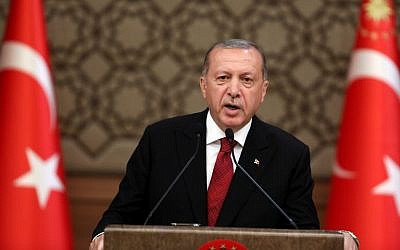- Joined
- Apr 18, 2013
- Messages
- 94,281
- Reaction score
- 82,665
- Location
- Barsoom
- Gender
- Male
- Political Leaning
- Independent
Turkey’s economy looks like it’s headed for a big crash

TurkishPresident Dictator Recep Tayyip Erdogan.
Erdogan will blame his shortcomings on the omnipresent Deep State (cleric Fethullah Gülen/the Kurd minority), and perhaps fall into the trap of borrowing money from Russian banks.
Related: Turkish bankers try to drag Erdogan toward monetary sanity to no avail

Turkish
7/13/18
It might seem strange to worry about an economy that grew 7.4 percent last year, but despite — or rather, because of — that good news, Turkey is showing all the classic signs of an emerging markets crisis. It’s pretty simple. Turkey has and continues to borrow a lot of dollars that are getting harder to pay back now that its currency is falling fast. Or, more specifically, its banks and companies have. But, in any case, the fact that its government hasn’t built up a big rainy-day fund of dollars has left it with a catch−22: Turkey can either try to save its economy from the effects of a weaker currency by increasing interest rates, or from the effects of higher interest rates by allowing its currency to continue dropping. Which is to say that it really has to decide how it doesn’t want to save things. But even though there are no good choices here, there are worse ones. Higher rates might slow the economy down enough that some companies would get into trouble, but a weaker currency would make that even more likely by increasing their debt burdens, potentially setting off a self-fulfilling panic. Foreign investors, after all, would pull even more money out of the country if they saw Turkish businesses going under — they’ve already been moving it out in response to the Federal Reserve’s rate hikes that have made holding money in the United States more attractive — which would then push their currency down even more, and, as a result, send even more companies into default.
The problem is that Turkey’s increasingly autocratic president, Recep Tayyip Erdogan, has a bad habit of mistaking correlation for causation. In particular, he thinks that low interest rates cause low inflation, which, as economist Andy Harless has put it, is akin to believing that umbrellas cause rain. For all the power he’s consolidated, Erdogan was only able to secure 52 percent of the most recent vote. That’s about as unimpressive as it gets when you’ve just purged the media, schools, army, and businesses of everyone but the most servile and supine; when you control the media to such a degree that your opponents could barely even get covered; and when you actually threw one opposition leader in jail. He just appointed his son-in-law to run the country’s finance and treasury departments — what sure looks like a rubber stamp in human form — and, after giving himself the power to choose the country’s top central banker, he “predicted” that “in the period ahead I believe that we will see that interest rates also fall.” It was enough to send the Turkish currency, the lira, down another 6.5 percent this week alone to bring it 23.7 percent lower than it was at the start of February. An economy, like a mind, is a terrible thing to lose. Erdogan appears well on his way to losing both.
Erdogan will blame his shortcomings on the omnipresent Deep State (cleric Fethullah Gülen/the Kurd minority), and perhaps fall into the trap of borrowing money from Russian banks.
Related: Turkish bankers try to drag Erdogan toward monetary sanity to no avail
